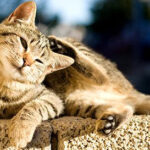It’s concerning when your feline friend turns their nose up at their favorite meal. As a devoted cat owner, you’re likely attuned to your cat’s eating habits, and any deviation can ring alarm bells. While cats can sometimes be finicky eaters, a prolonged refusal to eat can signal a more serious underlying issue. Understanding why your cat might not be eating and how long they can safely go without food is crucial for their health and well-being.
Decoding a Cat’s Loss of Appetite: 10 Potential Reasons
A cat’s sudden disinterest in food can stem from a variety of factors, ranging from minor upsets to significant health problems. Here are ten common reasons why your cat might not be eating:
- Oral Discomfort: Dental problems are a frequent culprit. Pain from inflamed gums (gingivitis), tooth abscesses, broken teeth, oral tumors, or other mouth injuries can make chewing and eating excruciating for your cat. Imagine trying to eat with a severe toothache – it’s no wonder they’d avoid their food bowl!
- Gastrointestinal Issues: Problems within the digestive system, such as parasitic infections, colitis, gastroenteritis, inflammatory bowel disease, or even cancer, can significantly impact a cat’s appetite. These conditions often cause nausea, discomfort, and a general feeling of unwellness that deters eating.
- Kidney Disease: Feline kidney disease is a common ailment, especially in older cats. As kidney function declines, it can lead to nausea and a loss of appetite. This is a serious condition requiring veterinary attention.
- Pancreatitis: Inflammation of the pancreas, known as pancreatitis, is another painful condition that can cause a cat to stop eating. Pancreatitis can lead to significant discomfort and digestive upset, making food unappealing.
- Digestive Obstructions and Discomfort: Constipation, indigestion, or physical obstructions in the digestive tract can all lead to a decreased appetite. A blockage prevents food from passing through properly, causing discomfort and suppressing hunger.
- Medication and Vaccination Side Effects: Just like humans, cats can experience side effects from medications or vaccinations. Loss of appetite can be a temporary reaction to these treatments, but it should be monitored.
- Psychological Factors: Stress, Anxiety, or Depression: Cats are creatures of habit and can be sensitive to changes in their environment. Stress from moving house, new pets, changes in routine, or even household tensions can manifest as a loss of appetite. Cats can also experience depression, which can impact their eating habits.
- Novelty Aversion: New Food: Cats can be surprisingly resistant to dietary changes. Introducing a new food, even if it’s a high-quality brand, can sometimes lead to temporary food refusal simply because they are not accustomed to the taste or texture.
- Slowing Metabolism in Senior Cats: As cats age, their metabolism naturally slows down. This can sometimes lead to a decrease in appetite as they require fewer calories. However, it’s crucial to rule out underlying health issues before attributing reduced appetite solely to age.
- Satiety in Outdoor Cats: If your cat spends time outdoors, they might be supplementing their meals by hunting or scavenging. Outdoor cats may catch rodents, birds, or even find food scraps, leading them to be less hungry at mealtimes at home.
The Critical Timeframe: Cat Survival Without Food
While cats can endure longer without food than water, prolonged fasting is dangerous. Generally, a cat can survive for approximately one to two weeks without food, but only around three days without water. However, this is a general guideline, and several factors can influence a cat’s ability to withstand food deprivation.
It’s crucial to understand that the longer a cat goes without eating, the weaker they become. Their body will start breaking down fat and muscle for energy, leading to a condition called hepatic lipidosis, or fatty liver disease, which is a severe and potentially fatal condition in cats. This condition occurs when fat accumulates in the liver, impairing its function.
Therefore, it is imperative to seek veterinary advice if your cat has not eaten for 24-48 hours, or sooner if they are displaying other concerning symptoms like lethargy, vomiting, or diarrhea.
Encouraging Your Cat to Eat: Practical Strategies
If your cat is showing a decreased appetite but hasn’t completely stopped eating, there are several things you can try to stimulate their hunger:
- Create a Calm Dining Environment: Stress can be a major deterrent to eating. Ensure your cat’s food bowl is placed in a quiet, peaceful area away from high-traffic zones or stressors.
- Maintain Food and Water Bowl Hygiene: Cats are fastidious creatures. Make sure their food and water bowls are clean. Dirty bowls can deter them from eating and drinking.
- Offer Palatable Food Options: Tempt your cat with highly palatable wet food or canned food. The stronger aroma and softer texture can be more appealing, especially if they have dental issues. You can also try warming the food slightly (ensure it’s not hot) to enhance its smell.
- Try Baby Food (Meat-Based, No Onion or Garlic): Plain meat-based baby food (check labels to ensure no onion or garlic, which are toxic to cats) can be very enticing for cats who are off their food.
- Enhance Dry Food Palatability: If your cat primarily eats dry food, try drizzling tuna juice (from a can of tuna in water, not oil) over their kibble to make it more appealing.
When Veterinary Intervention is Essential
While these home remedies can sometimes help, it’s crucial to recognize when professional veterinary care is necessary. Many of the underlying reasons for appetite loss are serious medical conditions that require diagnosis and treatment.
Contact your veterinarian immediately if your cat:
- Has not eaten for more than 24-48 hours.
- Is also refusing water or showing signs of dehydration (lethargy, dry gums).
- Exhibits other symptoms such as vomiting, diarrhea, lethargy, changes in behavior, or weight loss.
Your veterinarian can perform a thorough examination, run diagnostic tests to identify the cause of your cat’s anorexia, and recommend the appropriate treatment plan to get your feline companion back to their healthy, eating habits. Prompt veterinary attention is the best way to ensure your cat’s health and well-being when they stop eating.


